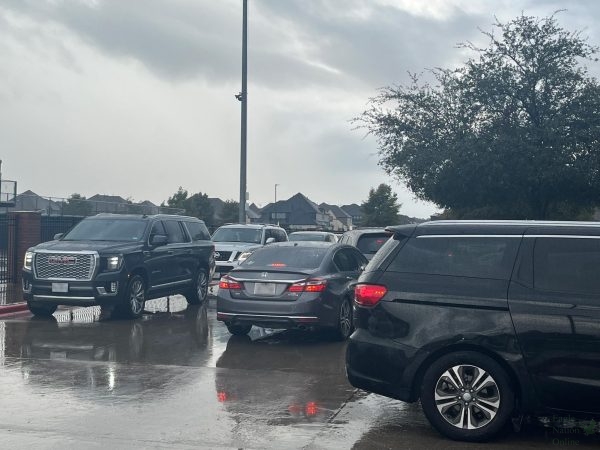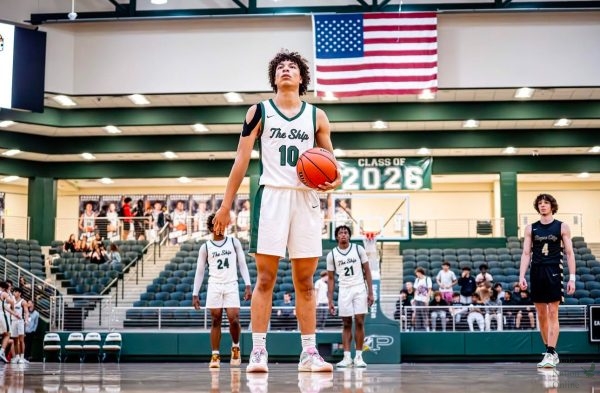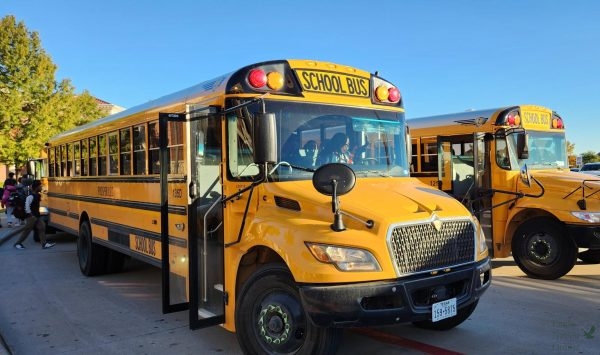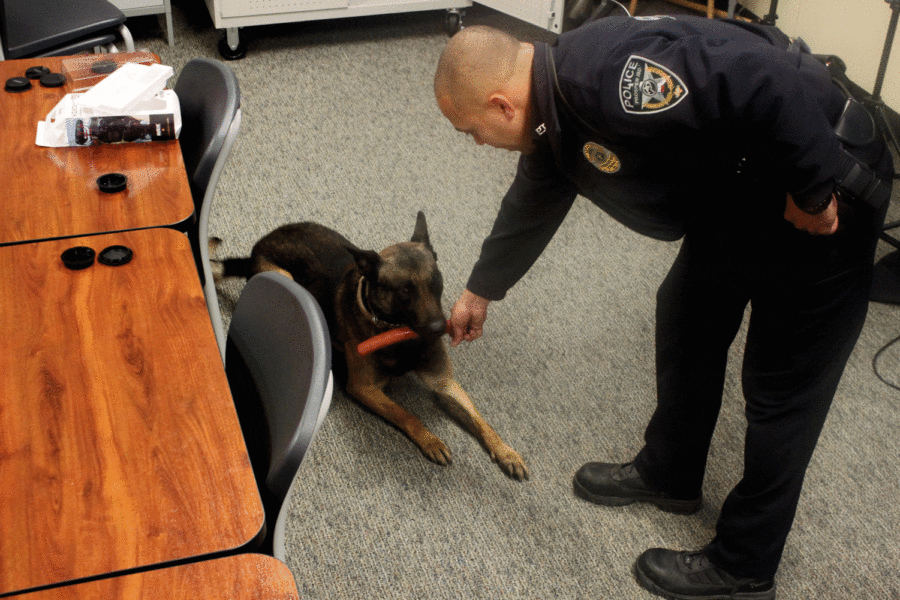Pay to park: the undisclosed price of a parking pass
Officer Steven Antommarchi and his K-9 partner Kaz visit the ENO newsroom on March 5 to educate the staff on the police force’s efforts to keep drugs off campus. In the attached editorial, staff writer Paige Ruder asserts the school should consider updating its current policy concerning the drug-testing of students. “The argument to be had against the current state of drug testing at Prosper is not about whether or not it’s necessary. It is absolutely necessary, and the police officers at the school have done a great job at keeping the school safe from drugs,” Ruder said. “But, the issue lies within the misunderstanding and confusion that surrounds the specifics of drug testing.”
In 1995, young activists brought the topic of drug testing in public schools to the attention of the Supreme Court in Vernonia School District 47J v. Acton. A drug problem was rampant through the school, and the athletes were found to be the main culprits. So, the school issued an ultimatum: all student athletes would be drug tested at the beginning of their season with 10 percent of the athletes being randomly selected to be drug tested every following week. Otherwise, they would either face suspension from sports or participate for six weeks in an “assistance program” that would require a weekly urine analysis. Consequently, students and parents alike raised concerns that their right to privacy was being violated, eventually bringing the case to the Supreme Court. The Court ruled 6-3 in favor of the school with the majority agreeing that the school was not violating any of the students’ rights, setting a precedent for future cases regarding drug testing in schools.
Prosper is different. If you’re in Prosper, you have the potential to be drug-tested, no matter what activities you partake in.
Though it’s naive to pretend that our halls are squeaky clean, we certainly don’t have a drug issue like Vernonia. When there is not a prominent drug issue at our school, it is unreasonable for the administration to conduct such frequent drug tests on such a wide scale. Yes, there is a need for drug tests, and even drug dogs. That is not being contested. Drug dog Kaz, along with Officer Steve Antommarchi, have made enormous efforts to keep the school safe with tangible results. Their presence in the school is a must. But the scope of drug tests should be limited to those playing sports and students representing Prosper at a district, regional, and statewide level through UIL or other competitions. Further, the administration should give more clear notice to students over who exactly is getting drug-tested through the form of at least an email or a form.
Again, the existence of drug-testing in a school setting is not the issue, nor is it a violation of any rights. The Fourth Amendment states that citizens should be protected from illegal search and seizure, and Griffin v. Wisconsin expands upon the amendment stating that “special needs, beyond the normal need for law enforcement, that make the warrant and probable cause requirement impracticable.” Because schools can act with “in loco parentis” authority over students – meaning they are legally “in place of parents” – they can overstep certain boundaries in order to act within the best interest of the students and their safety. This guardianship allows them to breach some privacy without necessarily needing the permission of the students–or their parents, for that matter. This dynamic is considered the “special need” that allows the school to conduct drug tests, making some students’ arguments that the drug tests are a violation of the fourth amendment inaccurate.
However, the specifics of who exactly is drug tested are not made clear. Though having a parking pass is a reason for students to be tested, the form for signing up to receive a pass does not state this clearly. At the bottom of the form for signing up to receive a pass, it is stated: “I also understand that driving to school is a privilege and that my parking permit may be revoked as a result of…violations of the Random Drug Testing Policy…The school reserves the right to search any vehicle on school grounds if reasonable suspicion exists. Vehicle drivers will be held responsible for any prohibited items, objects, or substances found in vehicles and will be subject to disciplinary action.” Though this drug testing is mentioned, it does not say that the drug tests will be conducted as a direct result of purchasing a parking permit. It is only in the Student Handbook that this information can be found. “It is the opinion of the Prosper ISD Board of Trustees that for the safety and well-being of all students, it is the district’s obligation to ensure to the extent possible, that participates in any extracurricular or co-curricular activity sponsored by Prosper ISD or who drive onto campus. Any PISD student in grades 7-12 may volunteer to participate in the drug/alcohol testing program. Coaches, teachers and sponsors may volunteer to be tested. Students not declaring their intention to participate in an activity prior to the school year beginning will be entered into the random pool prior to entering the activity or when they begin driving onto campus.”
The ruling of Vernonia School District 47 v. Acton states that is only acceptable for public schools to conduct drug tests if they are testing a specific population with which there is reasonable suspicion of drug use. The existence of this “random pool” violates the notion that the school is conducting drug tests aimed only towards a specific population where suspicion exists. The handbook seems to say that any student not participating in anything will be entered into this pool, meaning there is no “specific” subset of students being tested. Plus, surely every student who drives on campus can’t be suspected of drug use. And when the grand majority of students have parking passes, that can’t really be considered a “specific population” either.
The argument to be had against the current state of drug testing at Prosper is not about whether or not it’s necessary. It is absolutely necessary, and the police officers at the school have done a great job at keeping the school safe from drugs. But, the issue lies within the misunderstanding and confusion that surrounds the specifics of drug testing. The school needs to establish a more reasonable pool of students to test and inform the students of this pool.
Your donation will support the student journalists of Prosper High School. Your contribution will allow us to purchase equipment and cover our annual website hosting costs.










![As he works on his computer, sophomore Mark Carbajal sits in the Eagle Nation Online classroom. He has helped achieve EagleNationOnline.com's 2024-2025 Site Excellence Badge.
"I strived to improve my work, going beyond the requirements of my graphic design assignments," Carbajal said. "[Soon] I had come to the decision that Eagle Nation Online seemed like the most interesting path to me."](https://eaglenationonline.com/wp-content/uploads/2024/11/FinalPhoto-600x400.jpg)


